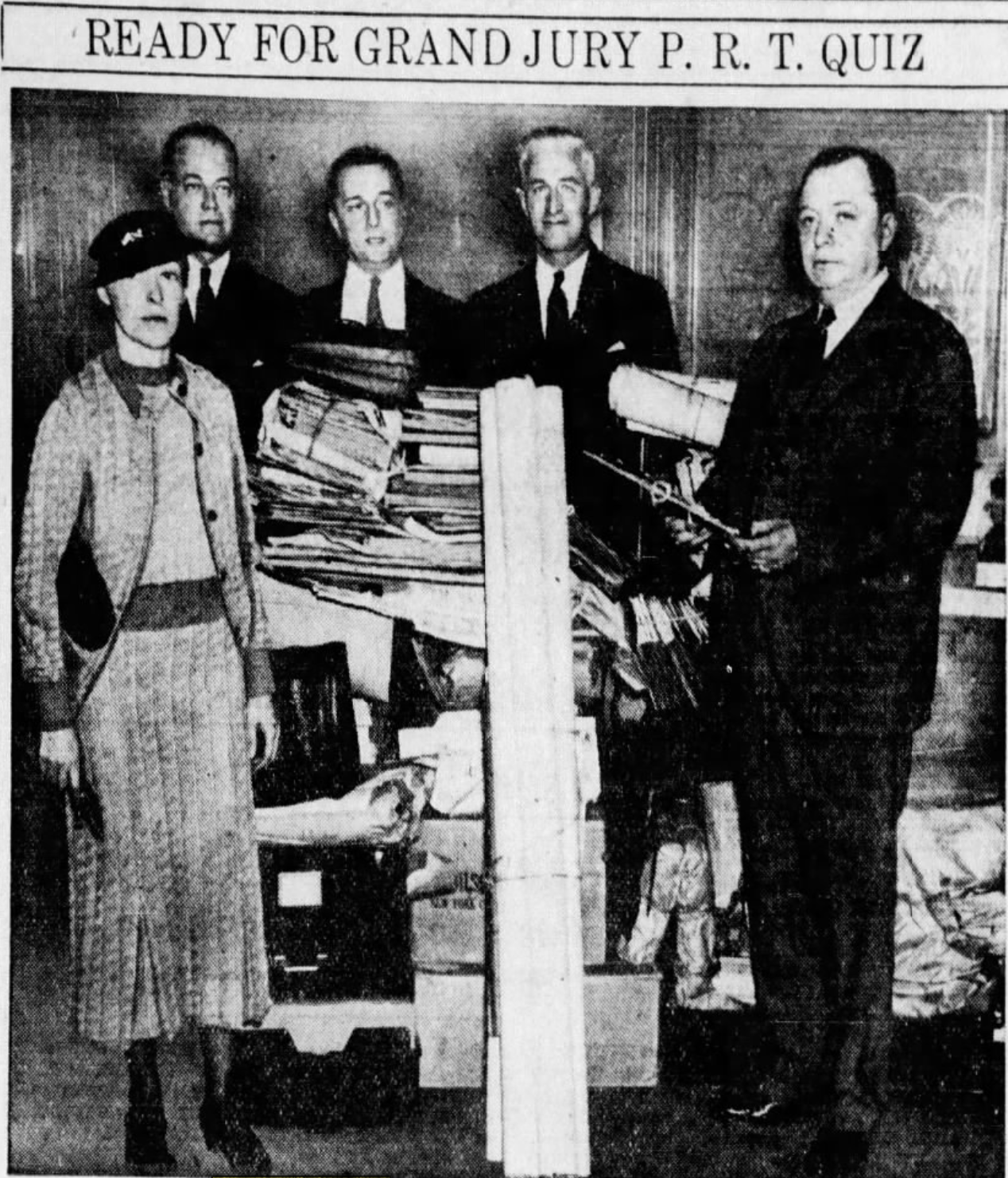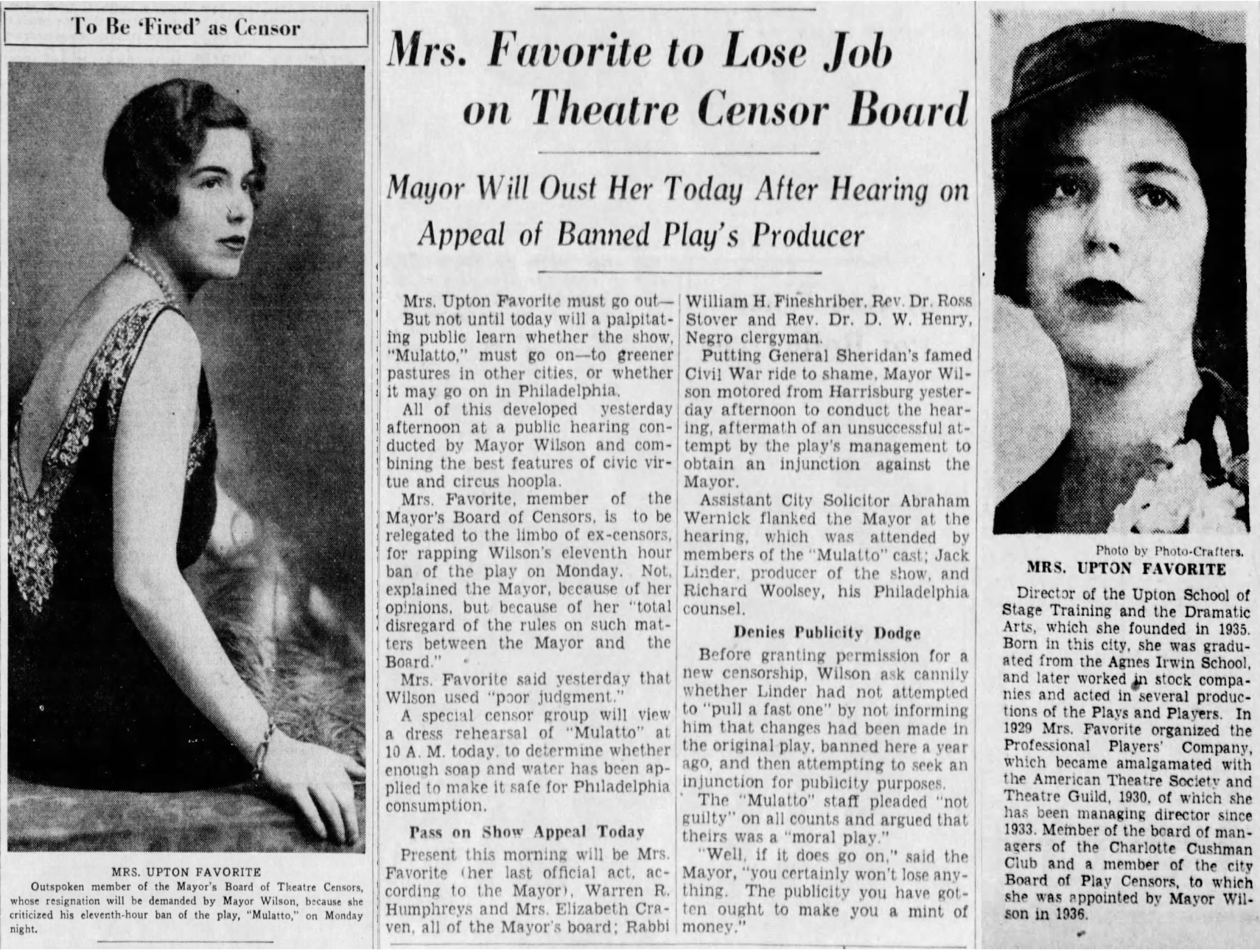
Philadelphia Mayor Samuel Davis Wilson being kissed by two women, at the ribbon-cutting ceremony for a new Florsheim shoe store - March 20, 1937. (Image courtesy of Explore PA History)
It's nice to find a photo of Mayor Wilson looking happy, because most photos of him show him with a rather grumpy expression. Grouchiness and outrage was sort of his thing. Here's another pleasant photo that was published in the Philadelphia Inquirer after his election. The Inquirer was a fervent pro-Republican newspaper back in those days, its publishers had tirelessly promoted Wilson's candidacy, even though he was a former Democrat. Many in the Republican establishment hated the Democratic candidate, the popular and handsome former Olympic rower John B. Kelly (father of Grace Kelly) - though we must note that in the long run Kelly is still remembered fondly in Philadelphia, and Wilson is not. There's no "Wilson Drive" along the Schuylkill River, after all.
The caption: "Mayor-elect Samuel Davis Wilson, yesterday elected to succeed J. Hampton Moore over his Democratic opponent, John B. Kelly, is shown with Mrs. Wilson and their children. Seated, left to right, Miss Elizabeth Wilson, Mayor-elect and Mrs. Wilson. Standing, Samuel, Woodrow and Alden Wilson."
And, yes apparently the family had named their oldest boy "Woodrow Wilson" after the former New Jersey governor and U.S. President. But the two families were not related.
Here are some other images of S. Davis Wilson from the years 1935-39. In the top image - also from the Inquirer, he is shown with piles of "evidence" that was to be presented in court against his long-standing foe, Philadelphia Rapid Transit company. In other photos from the Philadelphia Evening Bulletin, he is shown in his official car, "helping" to tear down an old tenement, and making a speech.
Below is the newspaper ad we mention in the podcast, where Wilson endorses the show 3 Men on a Horse:
Speaking of newspaper ads from the Amusements section, here the ad for New Faces of 1936, which was billed as "gay and peppy," as well as a photo of Rosetta and Vivian Duncan, who were performing the skit about the First Ladies that drew Mayor Wilson's ire. Earlier in the show they did another skit as a couple of donut ladies, during which they threw donuts out into the audience. They made sure to throw one into Mayor Wilson's lap, which reportedly delighted him - but then, as we detail, he only got grumpy again!
And here is the ad that appeared in the Philadelphia papers for Mulatto in February of 1937. As you can see, producer Martin Jones really was explicitly playing up the Southern Sex aspect of the show, so he certainly was looking for scandal and attention.
Here are two photos from the play, from the Billy Rose Collection of the New York Public Library. Left, a mob threatens a Black household servant after the Colonel, played by James Kirkwood, is found strangled. Right, the oldest son, played by actor Hurst Amyx:
Above, two historical figures mentioned in two separate segments of the episode: Detective Jacob H. Gomborow with Mrs. Eleanor Roosevelt. Gomborow was often assigned by the Philadelphia Police Department to escort important persons when the were in town, so it's not surprising that he was photographed with the First Lady. As we also noted in the episode, it was part of Gomborow's job to look after "subversive" political groups in Philadelphia. There was one time when that duty and his theater policing overlapped - in 1927 he told the director of a left wing drama group called "The Worker's Theatre Alliance" that its atheistic play entitled Mr. God Is Not In would not be allowed to perform in the city.
And I could not end this blog post without some images from the papers of Mrs. Upton Favorite (née Harriet Clay Leaf), and the stories about Wilson firing her from the Theater Control Board:
Selected Bibliography:
Cassel, Andrew, "The Philly Cop Who Doubled as a Theater 'Critic', Monitor of Decency," online article in the Philadelphia Inquirer, October 19, 2016. (This article also appeared in the print edition of the Inquirer in a slightly different form and title. See: "Keeping the Theater Clean", October 23rd, 2016, p. H05.)
Finkel, Kenneth, "The Censor Mayor," in Insight Philadelphia: Historical Essays Illustrated, Rutgers University Press, 2018, pp. 283-286.
Kirkland, Jack, Tobacco Road: A Three-Act Play, Viking Press, New York, 1934.
Rossi, John P. , "Philadelphia's Forgotten Mayor," Pennsylvania History, vol. 51, no. 2, April 1984
Tinkcom, Margaret S., "Depression and War: 1929-1946," in Philadelphia: A 300-Year History, Russel F. Weigley, ed., W.W. Norton & Company, 1982, pp. 601-648.
The Jacob H. Gomborow papers are in the Special Collections Research Center of Temple University Library. The finding aid for the collection is here.

















